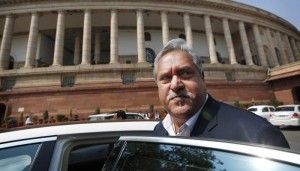India fails to get Mallya deported from UK
The Ministry of External Affairs (MEA) said on Wednesday that the United Kingdom has informed that it cannot deport Vijay Mallya to India for not owning a valid Indian passport.
“The UK government has informed us that under the 1971 Immigration Act, the UK does not require an individual to hold a valid passport in order to remain in the UK if they have extant leave to remain as long as their passport was valid when leave to remain or enter the UK was conferred. At the same time the UK acknowledges the seriousness of the allegations and is keen to assist Government of India. They have asked GoI to consider requesting mutual legal assistance or extradition, ” said MEA spokesperson Vikas Swarup.
The Hindu earlier reported that the UK government sent a note verbale to the High Commission of India saying it is unable to deport Mr. Mallya despite the fact that his diplomatic passport was revoked by the MEA on April 24. The note is a less formal diplomatic communication prepared in the third person. It is usually unsigned.
A non-resident Indian, Mr. Mallya has a U.K. residency permit since 1992. The Indian government has been told that though his passport has been cancelled, he has been staying there on a valid U.K. visa. The liquor baron’s name also figures in the U.K. electoral rolls. He lives in a three-storey mansion named Ladywalk at Tewin in Hertfordshire, not far from London.
As deportation is an executive action, it is considered to be a quicker process than extradition, in which investigating agencies have to establish prima facie culpability of the person. Besides, the accused has recourse to several defences under the extradition treaty.
Now, the extradition of Mr. Mallya from the U.K. will be possible only when he is accused, or convicted, of an act recognised as criminal offence in both the countries. The extradition treaty empowers the U.K. authorities to make provisional arrests in urgent cases.
However, Article 9 of the treaty lists the grounds available to an accused person on which a request of extradition can be refused. The person can, therefore, challenge the Indian government’s move in the court there.
In case the accused satisfies the U.K. authorities that the extradition has been sought for prosecution or punishment on account of some bias, or the alleged offence is of a trivial nature or that the accusation has not been made in good faith, the request can be turned down.
The Enforcement Directorate — which has approached the Interpol seeking issuance of Red Notice against Mr. Mallya — has earlier requested the Indian government to initiate deportation proceedings after his passport was suspended on the basis of a non-bailable warrant issued against him by a Mumbai court.
Mr. Mallya, promoter of the now-defunct Kingfisher Airlines that owes over Rs. 9,000 crore to nationalised banks, flew out of the country on March 2. The ED served three notices, seeking his personal appearance to join the probe in the alleged Rs.900-crore IDBI Bank money laundering case registered against him, the airline and others. However, he did not turn up, leading the agency to get an arrest warrant against him.
In July 2015, the CBI had registered a case against Mr. Mallya, Kingfisher Airlines and others.
Kindly send reply or comments on this topic to [email protected]
Source:Thehindu




